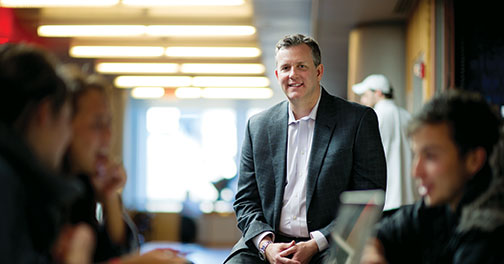Religion: The Good Samaritan
How do we think about our obligations to strangers in a global community?
Log on to Facebook and you may see requests to support a friend’s local breast-cancer walk and to donate to earthquake-relief efforts halfway around the globe. How do you decide which worthy causes to support? Professor of religion Eric Gregory has gone back to the biblical parable of the Good Samaritan for guidance about how to weigh our moral obligations in our rapidly shrinking global community.
In the Good Samaritan story, a traveler is beaten and robbed by bandits along the road from Jerusalem to Jericho. Two religious men pass by without offering assistance. Then a Samaritan arrives on the scene and binds the stranger’s injuries, carries him to an inn, and pays for his care. The Good Samaritan’s actions have been invoked by many over the years, for many purposes.
Henry Luce, the founder of Time and Life magazines, said that America should be “the Good Samaritan of the entire world” by bringing its way of life to other countries, Gregory notes. This line of thinking became a “pretense for paternalist and imperialist ambitions,” Gregory says. In 1967, Martin Luther King Jr. broadened the parable’s lesson from short-term charity to long-term institutional change. Proclaiming that “true compassion is more than flinging a coin to a beggar,” King used the Good Samaritan story to argue that one had an obligation to make the Jericho road safer. Gregory analyzes various applications of the parable in an upcoming book, What Do We Owe Strangers? Globalization and the Good Samaritan.
Princeton professor of bioethics Peter Singer argues that aiding needy global neighbors is such a moral imperative that people have a duty to forgo life’s extravagances and use the money to save lives in far-off countries. Singer’s philosophy “is very hard to live up to,” Gregory says.
But the Internet and the global economy have connected us to distant “neighbors” and increased the urgency of the discussion, Gregory points out. For most of human history, the question of responsibility to a stranger halfway around the world was largely hypothetical. Now we wear clothes made in sweatshops in Cambodia and read tweets about bombings in Syria.
Our consumption of international products and access to information about other countries has created new relationships that may make us complicit in injustice, Gregory says, and therefore we have a duty to educate ourselves about these issues and take action.
“The [Good Samaritan] parable reverses the question, ‘Who is my neighbor?’ which can be detached and speculative, to the more direct: ‘To whom am I being a neighbor?’” Gregory says. He hopes that people will ask themselves how often they are “crossing the road in the face of desperate need.”













1 Response
Franz Moser ’51
10 Years AgoProtection or Pretense?
As an old foreign student of the Class of ’51, I read with great approval Professor Eric Gregory’s statement (Life of the Mind, April 23) that the slogan “the good Samaritan of the entire world” would in his mind be “a pretense for paternalistic and imperialist ambitions” of the United States.
I still remember one of my Princeton colleagues in 1950 exclaiming with great enthusiasm: “We have the duty to save the world.” This attitude, it seemed to me, was typical of many of America’s elite since then. However, what has come of it if we remember President Bush’s actions in Iraq or presently the United States’ efforts in the Ukraine? How much of it is true, and how much is just a pretense for imperialistic and even sometimes anti-democratic actions?
Is the United States claiming to be the world protector of true democracy or just a hypocrite protecting its own interests, given actions in Serbia, Iraq, Afghanistan, Pakistan, etc.? I’m certainly not anti-U.S. in a general sense, but one has to differentiate critically between the one and the other.
This is the first step of a self-reflection to make this world a better place — of which so much talk is going on in Princeton, if you consider also President Eisgruber ’83’s intentions mentioned in the same issue of PAW.